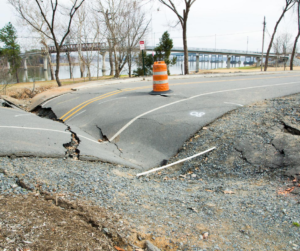What Should You Do if an Earthquake Hits?
No one wants to experience an earthquake. But these ground-shaking disasters can happen at any time, and in places where you never thought possible.
But what if, like most of our clients, you live on the East Coast? What if you’re a proud Midwesterner? Why should you worry about earthquakes?
The simple fact of the matter is that earthquakes happen in all states, and have since this country was founded. The USGS notes briefly that the East Coast has a long history of earthquakes, and though they aren’t as common, they can affect wider areas than their West Coast cousins.
Now that we have established that this can happen to anyone, let’s go over the steps you need to take to be as safe as possible.
And after that, how to deal with the claim.
How to Get Through an Earthquake

When the ground starts shaking, it can be hard to know if you’re experiencing an earthquake or something else. But if the ground is shaking for more than a second or two, and especially if it is an intense shake, assume it is an earthquake.
But what do you do? Whom do you protect first? And what about your stuff?
As most of our Safety Blogs, our advice is this: Protect yourself first, protect others second, protect property third.
- First, DROP, COVER, and HOLD ON.
- Get low to the ground to minimize the risk of falling over as the ground moves. Then, cover your head!
- One of the most common injuries during an earthquake is something falling on you after shaking loose from a wall or ceiling, so find cover under a desk, table or some other structure.
- Then, hold on. Put your arms over your head and hold on tight until the earthquake is over.
- Keeping yourself safe is the number one goal. Once you are safe from harm, make sure anyone else you’re with is safe and secure.
Dealing with the Damage

Danger doesn’t stop when the tremors go silent. Earthquakes often create as many hazards after the fact as they do during the shaking.
- Look around and see if anything has fallen over, broken, or caused some sort of obstacle that might cause problems for you or anyone else nearby.
- If you can immediately pick something up or make the area safer, go ahead and do so. But if you can’t, focus only on getting out of the house and surveying for damage.
- Once outside, look for signs of structural damage: cracks in walls, slanted windows, tilted roofs, or anything else that doesn’t look quite right.
- If you see serious structural problems, get out of the house and wait for help. The last thing you want is to be inside if something collapses.
Other Issues from Earthquakes

All that moving and shaking can lead to more than just fallen objects and broken walls. It can also result in secondary damage that might mean trouble, even if you don’t see it at first.
Earthquakes can cause landslides, power outages, power spikes, floods, tidal waves, land subsidence and other after-the-fact problems.
So keep this in mind when you start looking around for damage after the quake.
Not only can it cause other types of risks, but it can cause damage that you may not see in your house.
Pipes can be knocked loose or broken, causing water damage in areas where you may not notice until it’s too late. Look for signs of water in the kitchen and bathrooms, and also check ceilings and floors for damp spots, dark circles, drips or anything else that could mean water is leaking.
Another thing to look out for is electrical damage. Wiring can become torn, frayed, or overloaded, leading to shorts, surges or worse yet, fire.
Check for signs of electrical issues like lights that are out, sparks, dark areas around outlets and even downed power lines outside.
Claims After an Earthquake

If you have had earthquake damage, you probably want to use your homeowners policy to have repairs done. After all, isn’t that what insurance is for?
And yes, it is. But there is something crucial to know.
Homeowners Insurance does not cover Earthquakes.
I know, it’s surprising. But earthquakes are not a regularly covered item on your homeowners policy. Instead, they are an optional add-on.
If you have added the Earthquake Endorsement to your policy, then you ARE covered from earthquake damage. So let’s see how you would handle the claim.
- First, make sure you take pictures. Document all damage that you see, even going so far as to take a picture of the outside of your house even if you don’t see any apparent issues.
- Then, report the claim. Call or use the website of your insurance company, not the agency. If you’re using a company website or app, make sure you upload as many pictures as you can and give lists of any damaged items.
- Then, wait to hear from your adjuster. If you don’t hear from an adjuster within 48 hours, let your agent know. Work with the adjuster and give them all of the information you can to help them get your claim resolved quickly and accurately.
Once you’ve reported the claim to your company, feel free to talk to your agent. They can help guide you through the claims process and be your advocate if anything doesn’t go smoothly.
Get the Help you Need
Having the right coverage is crucial if you want to make sure you can survive something happening, no matter how bad it shakes you.
The good news is that you don’t have to do this alone. We have created a FREE INSURANCE CHECKLIST that guides you through the questions you need to ask to make sure you’re covered, step by step. If you aren’t getting a regular review, this checklist is a must. And even if you are getting a review, this can help you know what to look for so you’re informed, confident, and ready to rock your insurance like a boss.
Sound good? Click on the link below and get your FREE INSURANCE CHECKLIST today.

